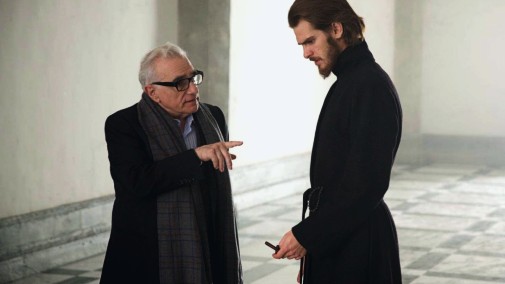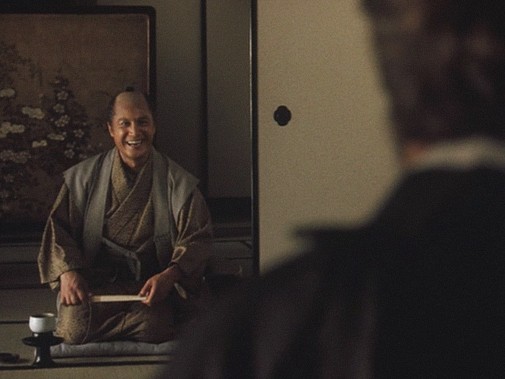Silence vs Silence
 Sunday, June 14, 2020 at 10:11AM
Sunday, June 14, 2020 at 10:11AM 
At times Martin Scorsese's filmography looks like a string of projects that took decades before they saw the light of day. These monstrous productions include films like the bloody epic Gangs of New York and last year's mob drama The Irishman, and the 17th century set religious historical drama Silence (2016).
Silence is near the top of my own list of favourite Scorsese films. There are many reasons for that, not least of which is the fact the original novel, by Japanese author Shûsaku Endô, is one of my favorite books and it focuses on Portuguese characters. Consider also the empathy Scorsese shows towards every character, along with the willingness to pursuit complex ideas and murky morality when a straightforward approach would have been easier to follow. These qualities are especially evident in Silence (2016) because we can compare Scorsese's adaptation to that of another world-renowned director…


In 1971, Masahiro Shinoda directed his own adaptation of Shûsaku Endô's book, having even collaborated with the novelist on the screenplay. Around half an hour shorter than Scorsese's 161-minute grand opus, Shinoda's Silence is a work of extreme severity both at the level of form and tone. Everything looks brown in this film, even sunlight and deep shadow, giving the pictures the appearance of living wood carvings. The compositions are studied and painterly, the soundtrack a shrieking dissonance that manifests interior thoughts when actors and script fail to do so. It's also a violent picture where the formal rigidity only highlights the horror onscreen.
The story is the same.
Two Portuguese Jesuit priests go to Japan in search of their missing mentor. After decades of easy evangelization among the local populations, Catholic missionaries have started to be prosecuted by Japanese authorities and the Christian faith has been effectively outlawed. In this violent climate, the two clergymen must hide, depending entirely on the kindness of converted peasants for their survival. While their purpose in Japan may be one of discovery and rescue, Silence quickly turns into an odyssey of suffering as we become witnesses to the horrors perpetrated against the Japanese Catholics, including heinous torture and protracted executions.

In the face of certain death, there's only one hope for earthly salvation – apostasy. People accused of following the Christian faith must step on sacred images, usually a carving of Jesus, to prove their innocence. It's easy to consider such a thing an easy way out, for even the magistrates describe it as a formality that doesn't deny the apostate's' faith. Nonetheless, to deny Christ is to accept damnation in the eyes of the devout. For the priests, this situation is particularly strenuous, since it challenges the teachings of the church and their moral compasses. Is it right to demand blind devotion when the alternative is punishment and death? Is suffering a necessity of faith?

The main character, Father Rodrigues, is thus ravaged by doubts which only worsen when it's not his life he is risking but that of the people who protected him. At the end of the day, this tortuous story isn't simple misery porn, but a vehicle for philosophical debate as well as historical reexamination. "Silence," the novel, is deeply critical of the Japanese, but it's not kinder to Portuguese Jesuits by any significant means. Rodrigues' perspective dominates the story, but even he starts seeing the failings of his logic, and the arrogance of his folly. Through his experiences, we find a critique of evangelization as an extension of European colonizing ambitions.

Their formal execution of the two films is radically different. The Japanese film chooses strict discipline while the American production embraces its epic scope with lush period detail and dramatic mechanisms aplenty. However, it's in regards to theme and adaptation that these director's visions are better contrasted. For Shinoda, Silence is a film about history and politics, about suffering and the breaking of a man's body. For Scorsese, it's a philosophical conundrum, one where faith takes center stage. In other words, the Japanese Silence is a story of flesh, while the American Silence is a tale of the spirit.
Shûsaku Endô is said to have disliked the '71 adaptations despite his involvement in the production, pointing at the climax as an especially unforgivable failure. Scorsese stages the scene when Rodrigues tramples the image of Christ as an occasion of spiritual transcendence, going as far as to break God's silence with a shocking voice-over. Shinoda, on the contrary, is much more direct and raw, portraying the moment as Rodrigues' breaking point rather than his ultimate act of faith. In the aftermath of such a scene, the directors also vary their approaches greatly, with the Japanese master choosing the cruelty of forceful sex to end his miserable narrative, while Scorsese looks for a morsel of hope.

Before concluding the comparison, one final element deserves consideration.
The acting is very different across the two Silences, and it goes way beyond the fact that one movie is predominantly in English while the other is in Japanese (Portuguese is mostly absent, and no cast member in either production can pronounce the main character's name). Summarily, we can observe that each filmmaker directed their cast following the way they used the camera. Shinoda's actors (including Tetsurô Tanba, a Japanese man, playing the priest's Portuguese mentor) work in a register of grim minimalism. Scorsese's actors, on the other hand, explode in paroxysms of emotion, using their bodies and ravaged voices to externalize their characters' tortured souls.

Still, despite such distinctions, the same character provides both films' with their MVP. Inquisitor Inoue is the narrative's main antagonist, though such a description may be too simple. The novelist and both filmmakers delay his entrance, presaging it with rumors of great malevolence. Because of that, when we finally meet him, we're somewhat disarmed by his banality, taken aback by how un-monstrous this monster appears to be. More than anything, he comes off as a strict but bored administrator, a man of logic and reason who is just as talented with rhetorical conversation as he is with inquisitorial carnage. After hearing his case, we are horrified by his methodology, but we also fear he may be right when it comes to the place of Catholic priests and Christianity in Japan.
In 2016, Issei Ogata was Scorsese's choice for the role and he delivers a performance of reptilian splendor. Famous for his comedic work and stage performances in Japan, the actor uses his entire body to give life to Inoue and, in one particular scene, he visibly deflates like a burst balloon when faced with Rodrigues' stubbornness. This interpretation of the figure is one that finds humor in his rhetoric, sadistic glee in his cruelty. It's also a quintessential character actor performance, adding color to the epic tale of pain and doubt.
In that regard, the 1971 version offers an astonishing contrast.

Eiji Okada, born 100 years ago, is one of Japanese cinema's greatest actors. Known for his participation in acclaimed art films like Hiroshima Mon Amour and Woman in the Dunes, Eiji Okada was internationally recognized when he stepped into the same character's shoes in 1971. His performance certainly suggests the confidence and authority of a star, for he dominates every scene he's in without ever having to move a muscle. Instead of grotesque, his take on the character forefronts his power and lets his taste for blood percolate in the background, almost out of sight but still palpable.
Within a film full of suffering where the cinematography itself succumbs to depression, Eiji Okada's Inoue shines like the sun. His slight smiles are razor-sharp stabs that puncture Silence's tone and let in a peculiar sort of exhilaration. The actor doesn't need to over-perform menace to be menacing, his mere presence is enough. Such is the minimalistic acting of a star full of innate charisma and sex-appeal. If you're a fan of Eiji Okada, you must seek out 1971's Silence. Even in a supporting role with little screen time, he is incandescent.

Both versions of Silence are available to stream. You can find Scorsese's movie on Popcornflix and GuideDoc. As for the film of Masahiro Shinoda and Eiji Okada, it's on the Criterion Channel.



Reader Comments (10)
Terrific article. Thanks for this.
Great article, Claudio. I believe "Silence" is one of Scorsese's most underrated movies in recent memory in terms of award recognition and audiences' attentions.
Now I have to watch the 1971's version
Scorsese's might be "lush" and "epic" in comparison, but I'd argue that it's among the director's most austere works. You don't get the big virtuosic gestures of, say, "Raging Bull" or "Goodfellas." It's much quieter, more contemplative, I think "The Irishman" is actually the most similar in tone from his oeuvre: glum and pensive over swaggering style.
Jonathan -- I agree with that assessment. In my Portuguese review of Silence, written for the movie's original release, I believe I called it one of the old master's most austere works, one that challenges the viewer to lose themselves in contemplation. At least, my notes say that. I love it, but I always seem to love Scorsese's grand meditations on faith.
Ed -- I was heartbroken when Silence was so utterly ignored during its awards season. The cinematography nomination was nice, but the film deserved so much more. I'd give Ogata the Oscar, and Scorsese deserved a nod for his adaptation even though I sometimes despise that over-emphatic narration.
Michael -- Thank you for the kind words. It means a lot coming from someone whose articles I love to read so much. I'm a great admirer of "The New Classics" series.
I'm glad someone picked up on Ogata's genius in the role,you keep coming up Claudio with really interesting well written articles.
I liked Silence a lot as it definitely play into the ideas of faith and how it can shake someone's beliefs. I think it's one of Scorsese's best films and Andrew Garfield should've been nominated for that film instead of the overwrought Hacksaw Ridge.
My personal MVP of Scorsese's film was Yosuke Kubozuka. He's my winner for 2016's best supporting actor. To be honest, I'm not a fan of Ogata's performance. Never heard of him before Silence (so I have nothing to compare to), but I think his comical approach was sometimes off and even distracting, when you compare it to the overall atmosphere of the film.
Scorsese’s was so beautiful
Claudio, wonderful article. I agree that this is one of Scorsese's greatest works. It has an icy beauty that haunts you. Why wasn't Garfield nominated for this instead of Hacksaw Ridge.
I found the Scorsese film lacked any texture, focus, or real point of view Andrew Garfield's hair was ridiculous and distracting. They really need Sandy Powel,l Costumes all looked like they were all from the same bolt of fabric.